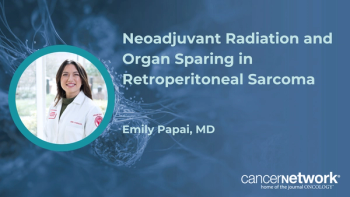
Researchers Detect Distinguishable Number of HER2-Low Cases Among Patients With Advanced Gastric Cancer
The findings, according to a group of researchers, warrant the development of treatments that attack HER2-low advanced gastric cancer.
HER2-low advanced gastric cancer was discernable enough from HER2-negative and positive disease among a group of patients to justify the development of future treatment options for that patient subgroup, according to data from a single-institution study presented at the
Overall, 21% of patients had HER2-low inoperable or recurrent advanced gastric cancer, and had immediately identifiable clinicopathological features in sex, histology, and metastatic site serum levels between those with HER2-negative and HER2-positive disease.
The aim of the retrospective analysis was to determine if HER2-low in gastric cancer can be distinguishable from HER2-positive or HER2-negative disease. Between 2011 and 2018, 750 patients with advanced gastric cancer were treated with fluoropyrimidine and platinum-containing chemotherapy. For this analysis, the researchers excluded 16 patients because a lack of available data on HER2 or FISH testing .
As a result, the study authors reviewed the findings from 734 patients, of which 410 had HER2-negative disease, 154 were HER2-low, and 170 had HER2-positive disease. The investigators defined HER2 disease as the following: HER2-negative with an immunohistochemistry (IHC) score of 0; HER2-low with IHC 1+ or 2+; and HER2-positive with IHC of 2+ or 3+. The data cutoff was August 2022.
The median age in the HER2-negative group was 64, 63 in HER2-low, and 64 in HER2-positive, with a majority of patients being male across all 3 groups (P = .193). The stomach was the most common location of the primary tumor with others including esophagogastric junction or the cardia (P = .029), with most being metastatic upon diagnosis (P = .001).
Most patients did not receive a gastrectomy prior to treatment (P = .008), and it was common for patients to have 2 or more metastases (P = .448).
The metastatic sites were split between either the liver (18.3% vs 24.8% vs 46.5%), distant lymph node (29.5% vs 37.0% vs 37.6%), or peritoneum (56.3% vs 44.8% vs 21.8%) in patients with HER2-negative, HER2-low, or HER2-positive disease, respectively.
The median overall survival among the HER2-negative group was 15.7 months (95% CI, 14.2-17.3), 15.7 months for patients with HER2-low disease (HR, 1.01; 95% CI, 0.82-1.23; P = .843), and 21.7 months (95% CI, 17.1-24.7) for those with HER2-positive advanced gastric cancer (HR, 0.73; 95% CI, 0.59-0.89; P = .002).
Progression-free survival (PFS) was evaluated if patients received subsequent chemotherapies. In those receiving taxane therapy, the PFS was 3.3 months, 3.5 months, and 4.1 months, across all arms respectively. The PFS for the 3 groups receiving irinotecan was 2.6 months, 2.4 months, and 2.5 months. For those receiving nivolumab (Opdivo), the PFS was 1.9 months, 2.1 months, and 2.7 months. Across all 3 regimens, there was no statistical difference in PFS.
To be eligible for the retrospective analysis, patients must have been aged 18 years or older, had histologically confirmed adenocarcinoma of the stomach or esophagogastric junction, and have had previously been untreated, inoperable, or recurrent advanced disease. Additionally, patients must have been treated with a platinum-containing regimen in the first-line setting and have confirmed HER2 status.
Exclusion criteria included having been previously treated at another hospital or being recurrent 6 months or more after the last therapy treatment.
The investigators concluded that the findings of the analysis confirm that the development of an effective treatment targeting HER2-low advanced gastric cancer is warranted.
Reference
Nakayama I, Takahari D, Chin K, et al. Clinicopathological features of HER2-low expressed advanced gastric cancers. J Clin Oncol. 2023; 41(suppl 4):459. doi:10.1200/JCO.2023.41.3_suppl.459
Newsletter
Stay up to date on recent advances in the multidisciplinary approach to cancer.





































